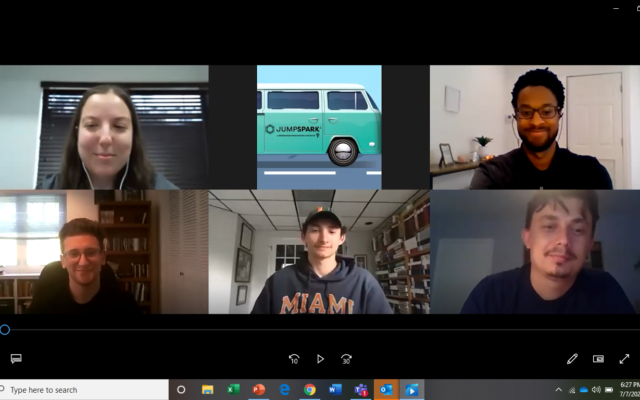Virtual College Road Trip
Online info sessions and tours offer hope to aspiring students and their families.

The summer college visit road trip, more than just a rite of passage for those fortunate enough to have the means, is an inherently hopeful act. For many of our teens and parents, visiting campuses is the culmination of years of work and planning, studying and dreaming. It is that first step out of the house and into adulthood. There are so many hopes and expectations wrapped up in finding the right school.
However, with travel indefinitely on hold, the college visit road trip seemed destined to become yet another milestone canceled.
Inspired by Springboard Chicago, which ran a virtual College Road trip in partnership with JCC Camp Chi in March, this immersive iteration was the brainchild of JumpSpark, based in Atlanta, and originally featured colleges and universities in the South. Through the cooperative opportunities of the Jewish Teen Education and Engagement Funder Collaborative, 4Front Baltimore joined up and added schools from the mid-Atlantic, growing the list to over 30 schools.
The partnership created what is believed to be the first-ever national virtual road trip for all college-bound teens and their parents.
During the month of June, more than 8,700 teens and their families visited Roadtriptocollege.org, where 35 colleges held virtual information sessions and student-led tours. Families and teens were able to #Jumponthebus and join virtual college tours with current students, admissions staff, and Hillel professionals; participate in teen and parent workshops; and interact via daily student takeovers on Instagram.
These personal interactions really helped students learn about campus life from the students’ point of view. Videos from the initiative had more than 1,300 views on YouTube, and 2,000-plus joined the information sessions and workshops, where they learned about the colleges, applications and financial aid.
Aspiring students were able to ask direct questions to admission directors, go on in-depth “tours” of the schools, and get to know the Jewish presence on each campus – an important factor in the tour process. We heard from many families who said their experience on the virtual college road trip helped reassure them that “this college admission experience, through all of this, will be OK.”
Amid all the excitement of college exploration, the virtual road trip has also emerged as an important platform to process the fact that both the road we’re on right now and the one ahead are rough. From uncertainty about the future of on-campus experiences to the turmoil currently wracking our country around systemic racism, staff from Atlanta and Baltimore have leveraged the road trip to explore things like the impact of COVID-19 on the admissions process, the importance of diversity to the college experience, the role of higher education in anti-racism, and the history of student activism and Black-Jewish cooperation in university settings.
In short, this evolved beyond what any of us could have imagined when the virtual college road trip idea was first generated. It became more than just college information sessions moved to Zoom. Rather, it was a deep immersive experience, exploring through a unique lens the issues that matter and seeking to recapture the feeling of actually visiting a school, speaking with students and faculty and imagining yourself there. In the midst of this pandemic and national tragedy, a new concrete way has been created to help teens envision and transition to the next chapter of their Jewish lives.
And it is more than that, too. This is giving families back something which we all so desperately need right now – the opportunity to engage in hopeful acts together.
Kelly Cohen is director of JumpSpark in Atlanta. Rabbi Dena Shaffer is executive director of 4Front Baltimore.





comments